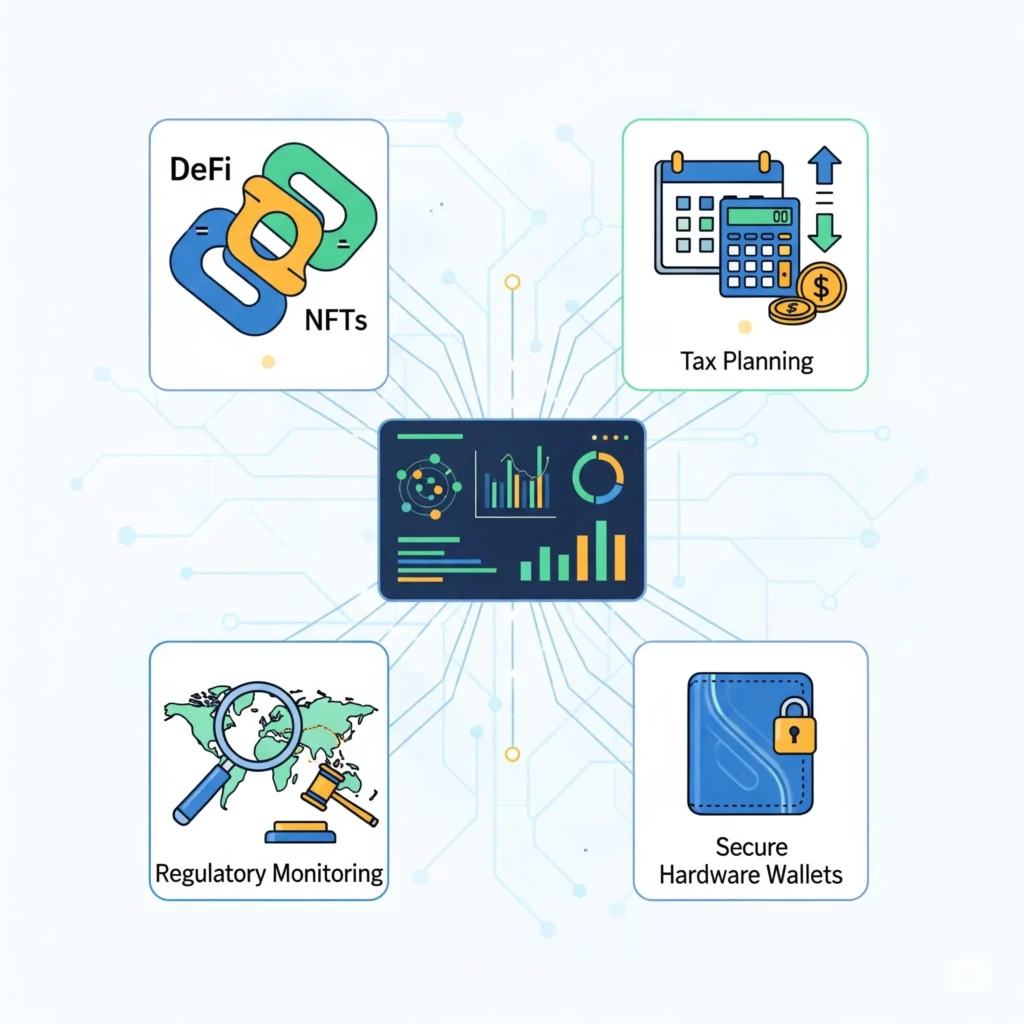Cryptocurrency is no longer just a buzzword; it’s a global financial phenomenon reshaping how we think about money, investments, and wealth. But with great opportunity comes great responsibility—especially when it comes to crypto taxation laws. In 2025, governments worldwide, including Bangladesh, are tightening their grip on digital assets, making it crucial for investors to understand the tax implications of their crypto activities. Whether you’re trading Bitcoin, staking Ethereum, or exploring decentralized finance (DeFi), failing to comply with tax regulations could lead to hefty fines or legal trouble.
Why is this topic trending now? The rapid adoption of cryptocurrencies, coupled with evolving regulatory frameworks, has put crypto taxation laws in the spotlight. In Bangladesh, for instance, the National Board of Revenue (NBR) is applying existing tax laws to crypto transactions despite a lack of specific regulations, creating confusion for investors. Meanwhile, platforms like Empire Crypto Data are helping users stay informed with real-time updates on crypto laws and market trends. This 2500+ word guide dives deep into cryptocurrency tax BD, income tax on crypto Bangladesh, and legal crypto earnings BD, offering actionable insights to help you navigate this complex landscape and maximize your financial benefits.
What Are Crypto Taxation Laws and Why Do They Matter?
Crypto taxation laws govern how governments tax cryptocurrency transactions, treating digital assets like property or income. These laws vary by country, but they typically cover activities like trading, mining, staking, and receiving crypto as payment. In Bangladesh, cryptocurrencies are still illegal under the Foreign Exchange Regulation Act of 1947, yet the NBR applies general tax laws to crypto-related income, creating a gray area for investors. Understanding these laws is critical to avoid penalties, ensure compliance, and optimize your tax strategy.
The importance of crypto taxation laws in 2025 cannot be overstated. With global crypto adoption soaring—Binance alone reports over 600,000 users in Bangladesh—governments are cracking down on tax evasion. Empire Crypto Data highlights that 56% of countries now impose taxes on crypto income, up from 48% in 2024. For Bangladeshi investors, navigating cryptocurrency tax BD is a must to protect your earnings and stay on the right side of the law.

Key Terms You Need to Understand
Before diving into the specifics, let’s clarify some essential crypto-related terms in simple language:
- Cryptocurrency: Digital or virtual currency secured by cryptography, like Bitcoin or Ethereum, operating on decentralized networks.
- Blockchain: A digital ledger that records all crypto transactions transparently and securely, forming the backbone of cryptocurrencies.
- DeFi (Decentralized Finance): Financial services like lending or staking built on blockchain, eliminating traditional intermediaries like banks.
- NFTs (Non-Fungible Tokens): Unique digital assets on a blockchain, often representing art, collectibles, or virtual property.
- Capital Gains Tax (CGT): A tax on the profit made from selling an asset, like cryptocurrency, at a higher price than you bought it.
- Income Tax: A tax on earnings, including crypto received from mining, staking, or as payment for services.
- Web3: The next generation of the internet, emphasizing decentralization, blockchain, and user-owned digital assets.
These terms will help you understand how crypto taxation laws apply to your activities and why staying informed with resources like Empire Crypto Data is essential.
Breaking Down Crypto Taxation Laws in Bangladesh
Current Legal Status of Cryptocurrency in Bangladesh
Cryptocurrencies remain illegal in Bangladesh under the Foreign Exchange Regulation Act of 1947, the Anti-Terrorism Act of 2009, and the Money Laundering Prevention Act of 2012. The Bangladesh Bank has warned that engaging in crypto transactions could lead to imprisonment or fines due to risks like money laundering and financial instability. Despite this, an underground market thrives, with platforms like Binance and KuCoin accessible to Bangladeshi users.
However, the government is exploring blockchain technology for applications like e-governance, signaling a potential shift toward regulated crypto use. Empire Crypto Data reports that discussions about legalizing cryptocurrencies are ongoing, but no concrete laws exist as of August 2025. This creates a complex environment for cryptocurrency tax BD, where general tax laws still apply to crypto earnings.
How Are Crypto Transactions Taxed in Bangladesh?
Since no specific crypto taxation laws exist in Bangladesh, the NBR applies the Income Tax Ordinance of 1984 to crypto transactions. Here’s how different activities are taxed:
- Capital Gains Tax (CGT): Profits from selling or exchanging cryptocurrencies are taxed at 15% for individuals. For example, if you buy Bitcoin at $20,000 and sell it at $30,000, the $10,000 profit is subject to CGT.
- Income Tax: Earnings from mining, staking, or receiving crypto as payment are taxed as regular income, with rates ranging from 0% to 25% based on your income slab.
- Value Added Tax (VAT): The application of VAT (standard rate: 15%) on crypto transactions is unclear, but it may apply in certain cases, such as crypto-to-crypto trades.
- No Specific Exemptions: Unlike some countries, Bangladesh offers no tax exemptions for crypto transactions, and losses can only offset other crypto gains, not other income sources.
Global Context: How Bangladesh Compares
Globally, crypto taxation laws vary widely. For instance:
- United States: Treats crypto as property, with short-term capital gains taxed at 10-37% and long-term gains at 0-20%.
- India: Imposes a flat 30% tax on all crypto profits, with no loss offsets allowed.
- Singapore: Offers no capital gains tax on crypto for individual investors, making it a crypto-friendly hub.

Bangladesh’s approach is stricter due to the outright ban, but the application of general tax laws aligns with global trends of treating crypto as property. Empire Crypto Data emphasizes that staying updated on international standards can help Bangladeshi investors anticipate future regulatory changes.
Real-World Examples of Crypto Taxation in Bangladesh
Case Study 1: The Underground Trader
Meet Rahim, a Dhaka-based freelancer who earns Bitcoin for his graphic design services. In 2024, Rahim earned 0.5 BTC, valued at $25,000 at the time of receipt. Under the income tax on crypto Bangladesh, he must report this as income and pay tax based on his income slab (e.g., 15% for middle-income earners). Later, if Rahim sells his Bitcoin for $30,000, he’ll owe 15% CGT on the $5,000 profit. Without proper reporting, Rahim risks penalties under the Money Laundering Prevention Act.
Case Study 2: The NFT Enthusiast
Sadia, a college student, creates and sells NFTs on an international platform. She earns $10,000 from NFT sales in 2025. Since NFTs are treated as property, Sadia must pay 15% CGT on her profits after deducting creation costs. However, her lack of awareness about legal crypto earnings BD leads to underreporting, triggering an NBR audit and fines. This highlights the importance of consulting resources like Empire Crypto Data for compliance guidance.
Pros and Cons of Crypto Taxation in Bangladesh
Benefits of Understanding Crypto Taxation
- Compliance: Proper tax reporting ensures you avoid fines, legal action, or asset seizure.
- Financial Planning: Knowing your tax obligations helps you budget for liabilities and maximize profits.
- Future Preparedness: As Bangladesh considers crypto regulation, early compliance positions you for smoother transitions.
- Global Alignment: Understanding international tax trends (via Empire Crypto Data) prepares you for potential policy shifts.
Risks and Challenges
- Legal Risks: Crypto’s illegal status in Bangladesh increases the risk of penalties under anti-money laundering laws.
- Complexity: The lack of specific crypto taxation laws creates confusion, requiring professional guidance.
- High Tax Rates: The 15% CGT and up to 25% income tax can erode profits, especially for frequent traders.
- Enforcement: The NBR uses KYC data and blockchain analysis to track transactions, making tax evasion difficult.
Actionable Advice for Beginners and Intermediate Investors
Navigating cryptocurrency tax BD can feel overwhelming, but these tips will help you stay compliant and optimize your investments:
For Beginners
- Start with Record-Keeping:
- Track every crypto transaction, including dates, amounts, and fair market values.
- Use apps like CoinTracker or Koinly to simplify record-keeping.
- Understand Taxable Events:
- Selling crypto, trading crypto-to-crypto, or receiving crypto as payment triggers taxes.
- Holding crypto or transferring between your own wallets is non-taxable.
- Consult a Tax Professional:
- A tax expert familiar with income tax on crypto Bangladesh can guide you through reporting requirements.
- Stay Informed with Empire Crypto Data:
- Follow Empire Crypto Data for updates on crypto laws and tax policies in Bangladesh.
- File Taxes on Time:
- The tax filing deadline is typically September 30. Missing it could lead to penalties.
For Intermediate Investors
- Optimize Tax Strategy:
- Hold crypto for over a year to potentially benefit from future long-term CGT rates if introduced.
- Offset crypto losses against gains to reduce your tax liability.
- Explore DeFi and NFTs Cautiously:
- DeFi staking and NFT sales are taxable as income or capital gains. Keep detailed records.
- Leverage Blockchain Transparency:
- Use blockchain explorers to verify transactions and ensure accurate reporting.
- Prepare for Regulation Changes:
- Monitor Empire Crypto Data for news on potential crypto legalization in Bangladesh.
- Diversify Income Sources:
- Spread your crypto activities (e.g., trading, staking) to manage tax exposure.
Frequently Asked Questions (FAQs)
1. Is cryptocurrency legal in Bangladesh?
No, cryptocurrencies are illegal under the Foreign Exchange Regulation Act of 1947, the Anti-Terrorism Act of 2009, and the Money Laundering Prevention Act of 2012. However, many Bangladeshis use platforms like Binance, and the government is exploring blockchain regulation.
2. Do I have to pay taxes on crypto in Bangladesh?
Yes, crypto transactions are subject to general tax laws. Profits from selling or exchanging crypto are taxed as capital gains at 15%, while mining or staking income is taxed as regular income (0-25%).
3. How do I report legal crypto earnings BD?
Include crypto profits in your annual income tax return, using standard forms for income and capital gains. Keep detailed records of transactions, including dates and values, to ensure compliance.
4. What happens if I don’t report my crypto taxes?
Non-compliance can lead to heavy fines, imprisonment, or asset seizure under tax and anti-money laundering laws. The NBR uses KYC data and blockchain analysis to track crypto activities.
5. Are there tax exemptions for crypto in Bangladesh?
No, Bangladesh offers no specific exemptions for crypto transactions. Losses can only offset other crypto gains, not other income sources.
6. How can Empire Crypto Data help me with crypto taxes?
Empire Crypto Data provides real-time updates on crypto taxation laws, regulatory changes, and compliance tips, helping you stay informed and avoid penalties.
7. Will Bangladesh legalize crypto soon?
While no timeline exists, discussions about regulating crypto and blockchain are ongoing. Empire Crypto Data reports that Bangladesh may align with global standards in the future.
Conclusion: Stay Ahead with Crypto Taxation Knowledge
Navigating crypto taxation laws in Bangladesh is a challenge, but it’s also an opportunity to protect your investments and stay compliant. With cryptocurrencies still illegal yet widely used, understanding cryptocurrency tax BD, income tax on crypto Bangladesh, and legal crypto earnings BD is crucial for avoiding penalties and maximizing profits. By keeping detailed records, consulting professionals, and staying updated via trusted sources like Empire Crypto Data, you can confidently manage your crypto portfolio.
Ready to take control of your crypto taxes? Start by tracking your transactions today and visit Empire Crypto Data for the latest insights on crypto regulations. Share this guide with fellow investors to spread the knowledge, and let’s build a smarter, compliant crypto community together!